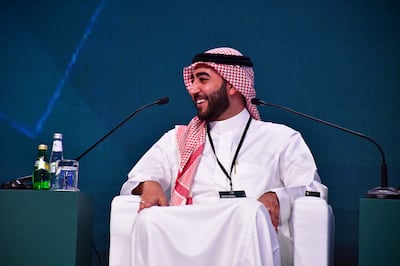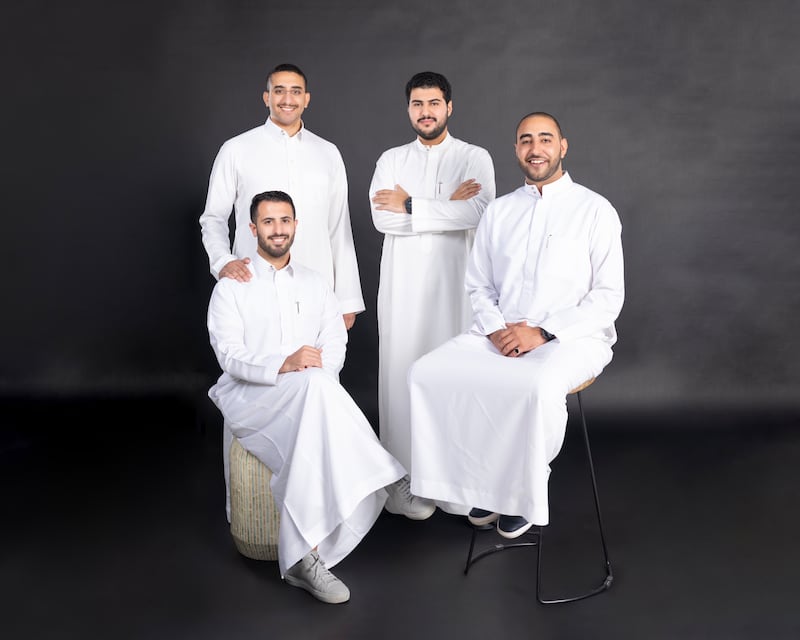When Yazeed Al Shamsi was a student in the UK he had to hand over a full year's rent up front for his accommodation. Finding it difficult, he looked for ways to pay the rent on a monthly basis instead.
After paying annual rent for two years, he found a solution, in the form of a lease guarantor.
“The company would come in and underwrite my credit risk to the landlord for an insurance fee and they would allow me to pay my rent monthly. If I missed a payment, they would pay the landlord on my behalf,” Mr Al Shamsi says.
Inspired by this concept, Mr Al Shamsi, along with his friends Fahad Albedah, Mohammed Alkhelewy and Khalid Almunif, launched Ejari in Saudi Arabia, a rent-now-pay-later platform that provides flexible payment options for people renting a home in the kingdom.
The Riyadh-based start-up, which launched last year, rents the residential unit on each customer's behalf and re-rents it to them with a monthly payment plan.
In Saudi Arabia, tenants are required to pay the rent in one cheque annually. The new platform is expected to help those who cannot pay a year's rent in full and opt instead for monthly payments.
“When a customer approaches me with his preferred choice of the unit, I screen them. I make sure he is creditworthy and doesn't have any defaults,” says Mr Al Shamsi, co-founder and chief executive of Ejari.
“I then go to the landlord, pay the one-year rent up front and I re-rent it to the customer.”
“This model really works for everyone: for the landlord to get more customers and for the tenants to pay their rent on a monthly basis,” he says.
The company charges tenants about 15 per cent of the total rent as its fee.
It has financed up to $1 million in transactions since the platform was unveiled in the second quarter of last year.
“Since we started six months ago, we got over 1,000 applications and the value of that demand is over $10 million,” Mr Al Shamsi says.
Demand to rent homes in the Arab world’s largest economy is rising as more people move to the kingdom amid the expansion of its economy and government initiatives to encourage non-oil growth.
This year Saudi Arabia introduced a regulation requiring firms to set up a base in the kingdom or risk losing out on government contracts.

However, companies with foreign operations below 1 million Saudi riyals ($266,000) can operate in the kingdom without local headquarters.
A number of global companies have relocated their regional headquarters to Saudi Arabia, boosting demand for homes as well as office space.
The kingdom hopes to have 480 global companies with headquarters in the country by 2030 amid efforts to improve economic output.
“The growing popularity of Riyadh, as it strives to become the regional business hub, has led to an increased demand for residential units,” consultancy JLL said in a recent report.
“This surge in demand was evident in the sale prices and rents, which saw notable growth of 7 per cent and 3 per cent, respectively, in the third quarter of 2023, compared to the same period last year.”
Ejari, which raised $1 million in funding last year with support from angel investors and other backers, aims to provide more services to customers, such as furnishing an apartment or providing removals services.

It also plans to expand its rent-now-pay-later platform to include the commercial, retail and industrial sectors.
It is also considering future regional expansion, but is currently focusing on Saudi Arabia as it is a “behemoth of a market”, with several opportunities for growth, Mr Al Shamsi says.
“Because of the inflow of people, there's much more demand than supply that's causing prices to go up.”
Government support for start-ups is “second to none on all levels”, he says.
The kingdom’s National Technology Development Programme supports the “entire lifetime of a start-up from ideation until being a unicorn”.
“They have 16 or 17 initiatives … when we started, they gave us a grant of $40,000 to go build our product, to go test the market with our products and then they provided us with free office space as well three advisers: legal advisers, technical advisers, financial advisers, whose only job is to help you and your start-up get off the ground,” Mr Al Shamsi says.
The initiative is also supporting founders with a salary of $3,000 to $4,000 per month.
The start-up ecosystem in the kingdom has continued to grow.
Saudi Arabia has become the top market for venture capital funding in the Middle East and North Africa for the first time, attracting more than $1.38 billion of investment in 2023, a new report has shown.
The kingdom recorded a billion-dollar figure for the second consecutive year, as venture capital investments surged by a third year-on-year, according to start-up platform Magnitt in its Mena Venture Investment Summary for 2023.
“Even banks are coming up with their VC arms to support start-ups … this is a huge shift because banks usually finance traditional industries,” Mr Al Shamsi says.
Q&A with Yazeed Al Shamsi, co-founder and chief executive of Ejari
How did you start your journey?
Ejari is my second start-up, I previously co-founded a venture that focused on algorithmic trading in Saudi Arabia but it failed to take off. I think the important thing is having or being mission-led. In the case of that venture, there was no mission other than to make as much money as possible. With Ejari, it's about solving an actual problem that myself and co-founders faced time and time again, but also a wider problem faced by the majority of renters in Saudi Arabia. Whichever venture I’d decide to start, I’d need to have a lot of passion for what I’d be doing and be a mission-led organisation.
What new skills have you learnt in the process of starting Ejari?
Resilience, perseverance and determination are the first that come to mind. We've already pivoted our business model six or seven times, which was not an easy thing to do – running with a certain model for a while and then realising that for a range of reasons it wouldn't work.
Experimentation is probably one of the most important things we’ve learnt: trying things and seeing what works and what doesn’t, getting feedback from customers and those in the market. People are willing to go to lengths in explaining their pain points, and that feedback is valuable in architecting your product and customer journey.
Who is your role model?
It is Crown Prince Mohammed bin Salman. The reason goes beyond the reforms that we have all witnessed in Saudi Arabia. He transcends politics – the modernisation, economic reforms and initiatives promoting social changes. [His] approach is one of enablement and potential realisation.
Where do you see yourself in 10 years?
A catalyst for positive change in people's lives. Wherever I am or whatever I'd be doing, there has to be an end goal of helping people. That's why we started Ejari, because an actual problem exists: people are genuinely struggling to pay their rent.
I'd like myself and my co-founders to create a ripple effect, empowering entrepreneurs, small businesses, and individuals to pursue their dreams and ventures. As a founder, the vision transcends profit. In a decade, I hope to look back and see a legacy built not only on financial success but on the tangible difference we've made in people's lives by creating value.
What is your advice for aspiring entrepreneurs?
If you’re going to try, go all the way. Otherwise don’t even start, because there are no shortcuts. You should just go for it and put the best plan you have into practice; it’s not going to be perfect and it will change along the way. Starting a company is quite glamourised but what most people don’t understand is how hard it is. We only hear about the successful ones.
They should stick in there, try their best, never quit and whenever they feel like they can't do it anymore, remember why they started. And when you have one of those days (as we all do), get a good night's sleep and [go] back at it in the morning. And they have to, no matter the circumstances, stay positive and resilient, and position themselves in a supportive environment, not only within the workplace but also with friends and family.






